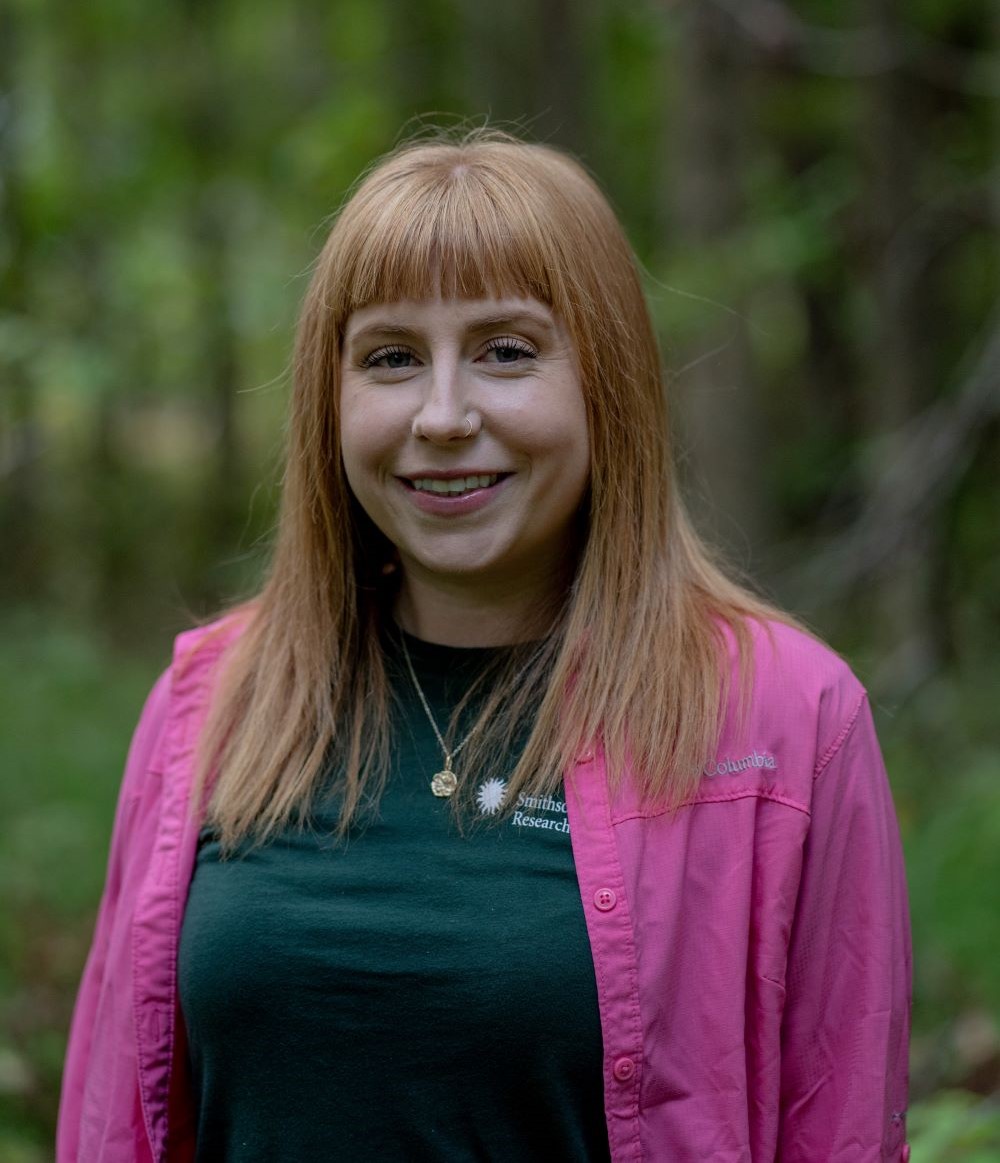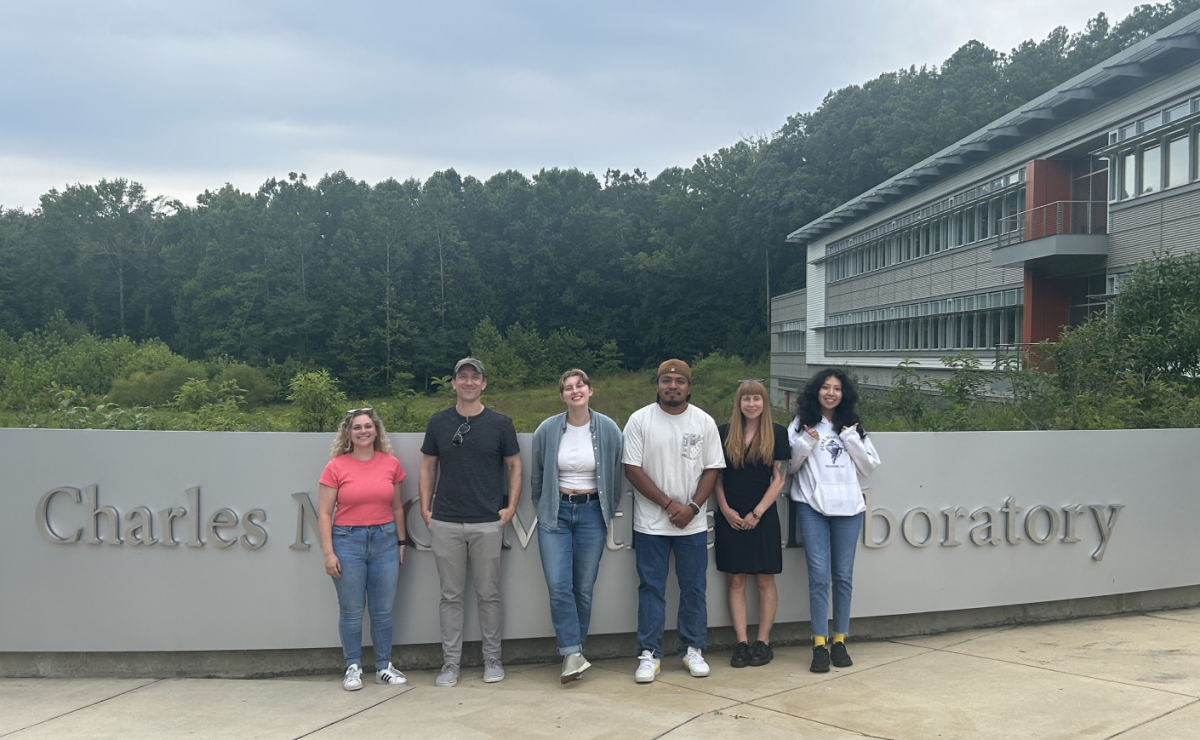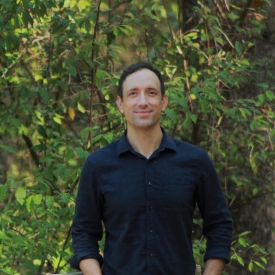Lab Members
Current Lab Members
Dr. Mary Cortese

Mary is a post-doctoral researcher working with both the Spatial Ecology and Conservation Lab and the Marine Conservation Lab. She earned her PhD in Biology from Temple University and she holds a BS in Marine Science from the University of South Carolina. Her research is centered around understanding the impacts of climate change on species biogeography and the subsequent impacts of altered biogeography on communities, landscapes, and ecosystems. Her work is multidisciplinary, utilizing field, laboratory, and modeling approaches.
Charlie Staines

Charlie is a retired research entomologist who spent his career with the US Department of Agriculture working to keep exotic insects and diseases out of the US, and as a beetle taxonomist with the Department of Entomology at the Smithsonian's Natural History Museum. A graduate of the University of Maryland, his research focus was developing effective and uniform sampling protocols for insect detection or inventories and on the distribution, natural history, and taxonomy of the large beetle family Chrysomelidae (leaf beetles) with approximately 40,000 described species. After retirement he began volunteering at SERC and developed a Citizen Science project to document the beetles found on SERC properties. As of the end of 2024, the program has documented 1090 species in 83 families. In 2023 he began collaborating with the Spatial Ecology and Conservation Lab studying the effects of microclimate on ground beetles (Carabidae). Currently he is developing an interactive key to the ground beetles known from Maryland to facilitate beetle identification.
Hannah Obenaus

Hannah is a post-baccalaureate research intern in the Spatial Ecology and Conservation Lab. She earned her B.S. in Environmental Sciences from University of North Carolina Chapel Hill in 2023. As an undergraduate she was involved in a variety of fieldwork and research projects that focused on owl conservation, microplastic loading in rivers, and the effects of residential tick control methods on insect communities. She is broadly interested in the effects of climate change and other human disturbances on community and ecosystem dynamics. She plans to pursue a master's and/or PhD in ecology and conservation and research ways to maximize biodiversity and ecosystem health in human-dominated landscapes.
Dr. Patricia Levasseur

Patricia Levasseur earned her Ph.D., M.S. and B.S. in Wildlife Conservation Biology at University of Massachusetts Amherst. Prior to starting her Ph.D., she worked as a contract biologist for the Massachusetts Division of Fisheries and Wildlife Natural Heritage and Endangered Species Program where she coordinated the implementation of the Piping Plover Habitat Conservation Plan, Blanding’s Turtle (Emydoidea blandingii) and Wood Turtle (Glyptemys insculpta) road mitigation, conservation and management strategies and assisted with Blue Spotted salamander (Ambystoma laterale) population assessments. Her Ph.D. research focused on the spatial population ecology of the Diamondback Terrapin (Malachlemys terrapin) at their northern range limit in Cape Cod, Massachusetts. She is active board member of the non-profit Diamondback Terrapin Working Group. Her research interests focus on rare species spatial population ecology and conservation, including responses to climate change, particularly in herpetofauna.
Dr. Suvarna Punalekar

Suvarna is a post-doctoral researcher based at NZCBI and SERC. Her research is dedicated to exploring the capabilities of remote sensing technologies for studying, monitoring, and preserving natural ecosystems. Having completed her PhD in remote sensing and vegetation modelling at the University of Reading, UK, Suvarna has since engaged in various research projects dedicated to the environmental application of remote sensing technologies. Her focus includes mapping extents and conditions of diverse landscapes and ecosystems, such as woodlands, wetlands, and pastures. Suvarna developed open-source, national-scale operational habitat maps for Wales as pat of her previous post-doctoral research for the Living Wales project at Aberystwyth University, UK. Currently at the Smithsonian Institution, her research is centered on mangrove ecosystems in the Mesoamerican reef region, where she is developing methods for an informed monitoring system. This system aims to support on-the-ground efforts to protect and restore these fragile ecosystems by providing a better understanding of environmental and social drivers and pressures. Suvarna's ultimate goal is to bridge the gap between data scientists and end-users, especially local communities. To achieve this, she aspires to integrate local knowledge and perspectives into her geospatial methods to create a more inclusive and effective approach to ecosystem monitoring and preservation.
Aidan Kirchgraber

Aidan is a post-baccalaureate intern in the Spatial Ecology and Conservation Lab. He earned a B.A. in Biology from Oberlin College in 2022, and has since worked as an environmental educator and urban farmer. Aidan is interested in researching the narrow to broad scale responses of systems to disturbance events, an interest that encompasses biogeochemistry, phenology, invasion ecology, climate change, paleoecology, and human systems. In collaboration with community members in Baltimore and Annapolis, his work at SERC will explore how extreme heat events drive changes in bird vocalization behavior inside and outside restored urban forests.
Dr. Susan Kotikot

Susan Kotikot earned her Ph.D. in Geography at Penn State University. She holds a BS in Environmental Planning and Management from Kenyatta University, and a M.S. in Earth System Science from the University of Alabama in Huntsville. Prior to starting her M.S., she worked at the Regional Center for Mapping of Resources for Development in Nairobi, mapping land use and land cover using remote sensing satellite data. During her masters, she worked as a research assistant with NASA-SERVIR, assisting with coordination of hub science activities and technical research for the SERVIR project. Prior to starting her PhD, she worked at the Oak Ridge national lab, developing tools and models for automated spatial data processing. Her research interests have evolved to include landscape ecology, climate change, remote sensing, and GIS. Her PhD research investigates agropastoral landscape change, and the collective role of climate and human activities with the goal of promoting social-ecological resilience. While at Penn State, she has actively engaged in collaborative research with experts from the Smithsonian Institution, developing mangrove cover maps for monitoring mangrove ecosystems in the Caribbean.
Casey Hamilton

Casey is a graduate intern in the Spatial Ecology and Conservation lab and a PhD graduate student in Penn State’s Department of Geography. Prior to coming to Penn State, he earned a B.S. in Ecology, Evolution, & Natural Resources and Environmental Geomatics from Rutgers University, New Brunswick in 2019. Since then, he has participated in field research at Brookhaven National Laboratory on a project involving remote sensing and crop health, and also spent several months at the Highstead Foundation in Redding, Conn., working to advance the scale and pace of land protection across New England. These experiences coupled with an undergraduate research project surrounding forest fragmentation and pollination in New Jersey amplified his interests in landscape ecology — particularly surrounding relationships between landscape pattern and ecosystem processes in a changing world.
Jonathan Drescher-Lehman

Jonathan earned his M.S. in Biology from George Mason University in collaboration with the Smithsonian Conservation Biology Institute, where he researched the movement ecology of Wood Turtles (Glyptemys insculpta) using miniaturized GPS units and radio telemetry. He also holds a B.S. in Biology from Eastern Mennonite University. His research interests broadly follow the life cycle of data, from collection through processing and analyses all the way to visualizations and dynamic plotting, automating steps wherever possible. More specifically, he's interested in understanding native species, communities, and ecosystems, as well as the factors that influence and alter them.
Shelley Bennett

Shelley is the head research technician of the Spatial Ecology and Conservation Lab. Prior to coming to SERC in 2021, she earned a M.S. in Ecology, Evolution, and Marine Biology at the University of California, Santa Barbara where she studied the range expansion, feeding preferences, and control methods of an invasive ambrosia beetle species complex (Euwallacea fornicatus and E. kuroshio) in riparian forests of southern California. She also holds a M.S. in Environmental Management from the University of San Francisco and a B.A. in Environmental Studies from the University of California, Santa Cruz. She's broadly interested in understanding how species respond to global change drivers such as climate change and land-use change, with a passion for forest ecology, insects, and conservation.
Past Lab Members

Undergraduate Interns
- Julia Koziatek (Wellesley College)
- Erin Allen (St. John's College)
- Eriberto Osorio (University of Maryland, Baltimore County)
- Marisy Nieto (Wellesley College)
- Sophie Coyne (Mount Holyoke College)
Teacher Externs
- Deborah Branch (Buck Lodge Middle School)
- Eva Sidorovich (Severn River Middle School)


